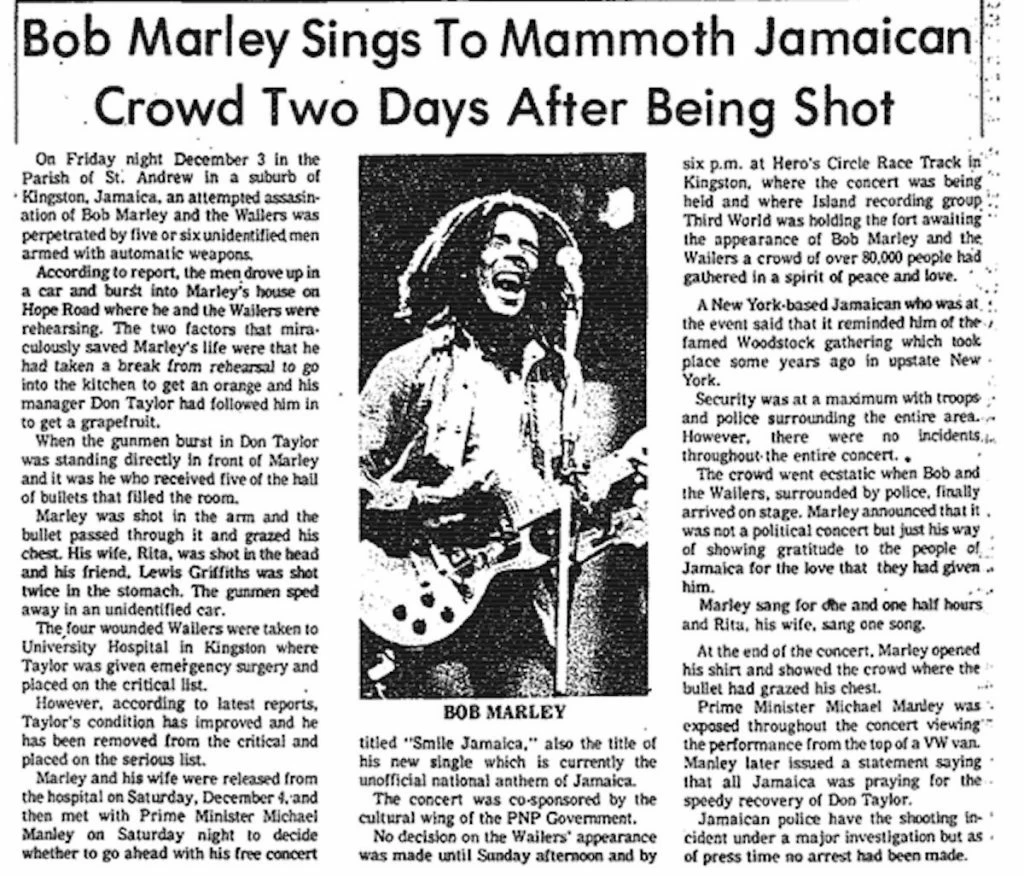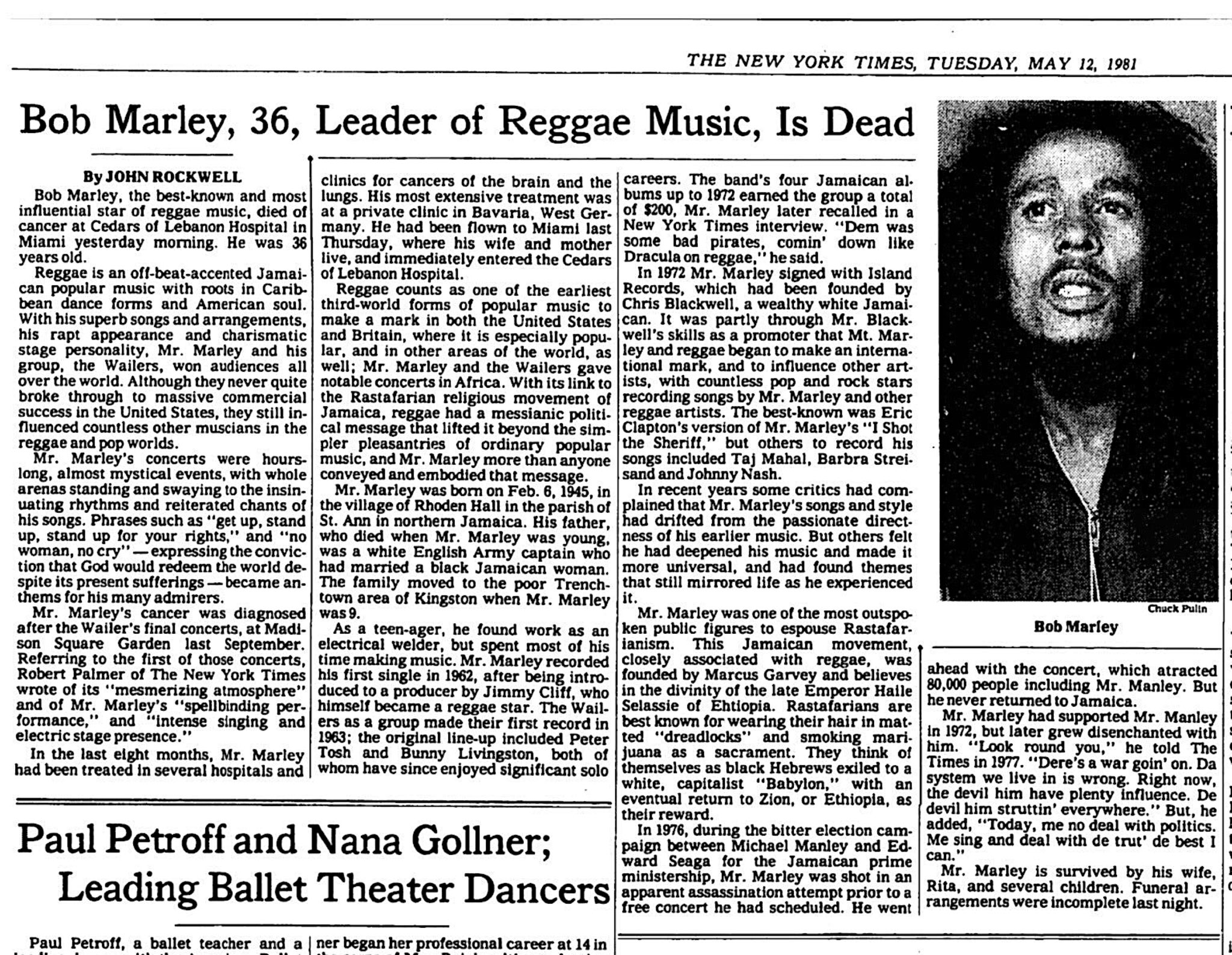Bob Marley's death remains a topic of fascination for fans worldwide. His music transcended boundaries, spreading messages of love, unity, and resistance. But behind the legend lies a story of struggle and courage in the face of adversity. So, let's dive into the reasons behind his passing and uncover the truth behind this iconic figure's final days.
When you think about reggae, one name instantly comes to mind—Bob Marley. His voice became the anthem for a generation, and his songs continue to inspire millions. But like all great stories, his journey had a bittersweet ending. Today, we're here to explore the reasons behind his untimely death and shed light on the events that led up to it.
Bob Marley's legacy lives on, but understanding the circumstances surrounding his death adds depth to his story. It’s not just about the music; it's about the man behind the melodies. So, buckle up as we take a deep dive into the truth behind his passing and the lessons we can learn from his final days.
Read also:Unveiling The Magic Of Moments Capture Lifes Treasures
Table of Contents
- Bob Marley's Biography
- Early Life and Rise to Fame
- Medical Issues Leading to His Death
- The Cancer Diagnosis
- Final Days and Farewell
- His Legacy Beyond Death
- Impact on the Music Industry
- Debunking Myths About His Death
- Raising Health Awareness Through Bob's Story
- Conclusion and Reflection
Bob Marley's Biography
Who Was Bob Marley?
Bob Marley, born Nesta Robert Marley on February 6, 1945, in Nine Mile, Jamaica, was more than just a musician. He was a cultural icon, a voice for the oppressed, and a symbol of peace. His life was a testament to resilience and creativity, even in the face of adversity.
Here's a quick look at some key facts about Bob Marley:
| Full Name | Nesta Robert Marley |
|---|---|
| Birth Date | February 6, 1945 |
| Place of Birth | Nine Mile, Jamaica |
| Occupation | Singer, Songwriter, Guitarist |
| Genres | Reggae, Ska, Rocksteady |
| Years Active | 1963–1981 |
His journey from a small village in Jamaica to becoming a global superstar is nothing short of legendary. But his story didn’t end with fame—it continued through his struggles and eventual passing.
Early Life and Rise to Fame
From Humble Beginnings to Global Stardom
Bob Marley's early life was marked by challenges. Growing up in a racially mixed family, he faced societal prejudice but used it as fuel for his art. His passion for music began at a young age, and by the time he formed The Wailers with Peter Tosh and Bunny Wailer, his career was on the rise.
By the 1970s, Bob Marley had become a household name. His albums like "Catch a Fire" and "Exodus" propelled him to international fame. But little did anyone know that behind the scenes, health issues were quietly creeping up on him.
Medical Issues Leading to His Death
The First Signs of Trouble
Bob Marley's health problems began subtly. In 1977, while playing soccer, he noticed a small wound on his toe that wouldn’t heal. At first, he brushed it off, thinking it was just a minor injury. But as time went on, the wound grew worse, and tests revealed something far more serious.
Read also:Hismost The Ultimate Guide To Unlocking Its Potential In 2024
Bob was diagnosed with acral lentiginous melanoma, a rare form of skin cancer. The diagnosis came as a shock, but Bob, ever the fighter, decided to battle it with his usual resilience. However, his decision to avoid surgery due to his Rastafarian beliefs would prove to be a turning point.
The Cancer Diagnosis
Facing the Reality of Melanoma
Acral lentiginous melanoma is a particularly aggressive form of cancer that affects dark-skinned individuals. It often appears on the palms, soles, or under the nails. For Bob, the cancer had already spread by the time it was detected, making treatment options limited.
Despite the grim prognosis, Bob continued touring and performing, driven by his passion for music and his desire to spread his message. But the cancer was relentless, and it eventually caught up with him.
Final Days and Farewell
A Hero's Journey Comes to an End
Bob Marley's final tour, the "Uprising Tour," was both a triumph and a tragedy. By this point, his health was visibly deteriorating, but he refused to stop. In September 1980, during a concert in Pittsburgh, he collapsed on stage, marking the end of his performing career.
Bob was taken to a hospital in Germany, where he underwent alternative treatments. But the cancer had spread too far, and on May 11, 1981, Bob Marley passed away at the age of 36. His final words to his son Ziggy were, "Money can't buy life," a poignant reminder of his values.
His Legacy Beyond Death
A Voice That Echoes Through Time
Even in death, Bob Marley's influence continues to grow. His music remains a beacon of hope and resistance, inspiring generations to come. Albums like "Legend" have become timeless classics, ensuring his legacy lives on.
But Bob's legacy extends beyond music. He was a symbol of peace, love, and unity, and his message resonates as strongly today as it did during his lifetime. His commitment to social justice and equality continues to inspire activists and artists worldwide.
Impact on the Music Industry
Revolutionizing Reggae and Beyond
Bob Marley didn’t just popularize reggae; he transformed it into a global phenomenon. His fusion of political messaging with catchy rhythms created a unique sound that appealed to diverse audiences. Today, countless artists cite him as a major influence, proving his lasting impact on the music industry.
Moreover, his work paved the way for other Jamaican artists to gain international recognition, creating a ripple effect that continues to shape the music scene today.
Debunking Myths About His Death
Separating Fact from Fiction
Over the years, numerous myths have surfaced about Bob Marley's death. Some claim he died from a curse, while others suggest foul play. But the truth is far simpler yet equally tragic.
Bob Marley's death was the result of untreated cancer, compounded by the demands of his rigorous touring schedule. His reluctance to undergo surgery due to his beliefs added to the complexity of his situation. It’s a reminder of the importance of early detection and proper medical care.
Raising Health Awareness Through Bob's Story
Learning from the Past
Bob Marley's story serves as a powerful lesson about health awareness. His experience highlights the dangers of ignoring warning signs and the importance of seeking timely medical attention. In a world where health disparities still exist, his story can inspire others to prioritize their well-being.
Today, organizations and advocates use Bob's story to raise awareness about melanoma and other forms of cancer. By sharing his journey, they hope to encourage early detection and prevention, ensuring that others don’t face the same fate.
Conclusion and Reflection
Bob Marley's death was a tragic loss for the world, but his legacy endures. His music continues to inspire, and his message of love and unity remains as relevant as ever. As we reflect on his life and passing, we’re reminded of the importance of both art and health awareness.
I urge you to share this story with others, to keep Bob Marley's memory alive. Whether it’s through his music or by learning from his experiences, we can all contribute to his enduring legacy. So, take a moment to reflect, and let’s honor Bob Marley by spreading his message of peace and love.
Feel free to leave a comment below, sharing your thoughts or memories of Bob Marley. Together, we can keep the spirit of this legend alive for generations to come.
References:
- Bob Marley Foundation
- World Health Organization
- National Cancer Institute


